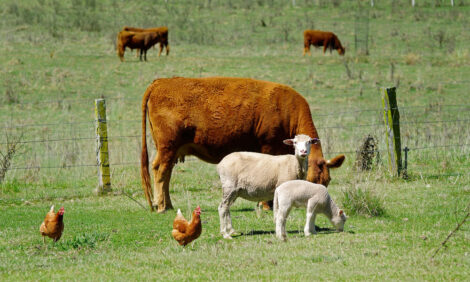



Impact Of Intervention Stocks On Dairy Prices
UK - The Ulster Farmers’ Union (UFU) has received assurances from the EU Commission that Dairy Intervention Stocks will only be released onto the market during 2010 in a manageable way so that market prices will remain stable. UFU President Graham Furey met with a Senior Commission Dairy Official in Brussels this week.Graham Furey commented; “The EU Commission have assured us that the release of Intervention Stocks will not be allowed to de-stabilise dairy prices. Following recent public comments, it is disappointing to hear that local dairy processors are focusing more on reasons why farmgate milk prices should be lower rather than seeking to sell dairy products more strongly and maximise returns to producers. Everyone knows that milk returns at 18 or 20 pence per litre is not profitable or sustainable.”
“There has been debate surrounding the impact of releasing intervention stocks onto the market. The UFU strongly believes that positive market conditions and the EU’s commitment to manage this process carefully means this speculation amounts to nothing more than scaremongering”.
The UFU’s Dairy Policy Officer Chris Osborne provides his analysis of dairy sector conditions:
During the dairy crisis in 2009, the EU Commission introduced a package of measures including re-introducing export refunds for dairy products. Intervention was extended for Skimmed Milk Powder and butter, both in terms of volumes and opening period. Intervention buying is normally limited to 30,000 tonnes of butter and 109,000 tonnes of SMP and was only meant to be open from 1 March to 31 August, but was extended until February 2010. Private Storage Aid for butter was also opened from early 2009 until the end of February 2010.
The EU Commission also released the Emergency Dairy Fund (€300m) and this combined with the use of market management tools has resulted in the return of relatively stable EU dairy prices.
The Agriculture Commissioner wanted to ensure that the EU did not end up with another “butter mountain” and hence her reluctance during the 2009 crisis to increase intervention prices (even temporarily). Consequently, when the UFU met with senior EU dairy officials back in September, we originally received assurances that when it came to releasing intervention stocks, it would be done so in a manageable manner so as to ensure that there would be no downward shock to milk prices.
Export Refunds
Market analysis would indicate that even without export refunds, butter and SMP are competing on world markets above intervention price levels. Export subsidies were all set to zero in November 2009. There is a small quantity of pre-fixed export refunds for butter in the market, but the impact of this upon price is questionable.
The impact of Export Refunds being reduced to zero has already been felt in the January 2010 United Dairy Farmers auction when the price dropped from 27.72ppl to 24.05ppl. A similar drop in the next auction on 25 February can therefore not be justified.
EU Intervention Stocks – As of 10 February 2010, intervention stock levels are;
- Butter 76,341 tonnes
- SMP 257,321 tonnes
Of the above stock, 51,148 tonnes of butter and 65,290 tonnes of SMP will be allocated to a Deprived Persons Scheme and this scheme is not expected to be released until May/June. Once this stock is taken out the equation, there will be 25,193 tonnes of butter and 192,031 tonnes of SMP remaining in intervention stores.
There has been no further product accepted into intervention for a number of months now, despite the stores being open throughout the winter.
The volume involved in the Deprived Persons Scheme will have no impact on price as there is so little involved. As far as the remaining stock is concerned (25,103 tonnes of butter and 192,031 tonnes of SMP) the UFU received strong re-assurances from the EU Commission that there will be no rush to put this onto the market. The earliest this remaining stock can be released is August 2010. The release may not even commence on this date and if it does, the EU have once again stated that it will be carried out in a managed manner so as not to de-stabilise the price, as it is not in their own interests to do so.
Private Storage Aid for butter – Up until 15 August 2009, 134,184 tonnes of butter was offered to Private Storage. It would appear that the Commission have been overseeing a responsible release of 2009 butter stock from Private Storage with monthly volume slowing down to 2,000 – 3,000 tonnes and only 24,000 tonnes remaining in storage.
According to industry sources, little use has been made of the extension announced last year with only 6,384 tonnes being put in to storage after 15 August 2009 and of this, the majority of volumes have moved in the last six weeks at the rate of 500-1,000 tonnes a week for the last 6 weeks. These stocks however cannot be released onto the market until August 2010.
As far as the UK is concerned a modest 3,311 tonnes of butter went into private storage and this has now diminished to 1,356 tonnes.
The Union has been cautiously optimistic on milk price for some time now. This optimism remains and is based on a number of reasons.
2010 has started under firmer market conditions compared to the same period in 2009, with EU milk deliveries lower and spot market prices higher.
Skimmed Milk Powder (SMP) – An increase in production in 2009, but this was matched with an increase in exports (with January – November 2009 seeing an increase of 27.7 per cent) as EU SMP prices are competitive on world markets, even without Export Subsidies. As well as this, forecasts indicate that SMP production is likely to fall in 2010.
Fonterra is due to start offering SMP from the March 2010 on its global trade auction. This is a sign of the confidence that the SMP market is firm enough to cope with volumes being traded in the world’s largest internet auction. Industry analysts expect that this March trading event will become a benchmark price for global SMP and non-fat dry milk trade.
Butter – Prices were recovering in the last quarter of 2009 but experienced a slight dip after Christmas and a further slight fall in January. However, the scope for optimism continues as the EU prices are still 30 per cent above intervention levels and competing on world markets. Stock levels have been falling since the start of 2010.
Whey – In January, the whey price has moved up by 3.66 per cent. This is very positive news since industry analysts indicate that this is always a signal of future upward movement in prices for dairy markets.
The EU’s response to the crisis in the Dairy sector exhibits a willingness on their part to use these market management tools correctly and provide exceptional support where necessary. Against this background of wider market conditions and the EU Commission’s responsible approach to the management of its stocks of dairy products, the UFU believes that there is no reason why prices should not now stabilise and NI farmers should therefore be receiving a price which at least reflects the costs of production.


